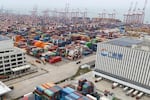Oregon Attorney General Dan Rayfield is suing President Donald Trump over the administration’s aggressive tariffs that have routed markets and upended global trade.
The lawsuit, filed Wednesday in the U.S. Court of International Trade in New York, is the first time Oregon has led a coalition of states suing the second Trump administration.
The lawsuit argues the U.S. Constitution grants Congress, and not the President, the power to impose and collect taxes.
“Yet over the last three months, the President has imposed, modified, escalated, and suspended tariffs by executive order, memoranda, social media post, and agency decree,” the lawsuit states. “These edicts reflect a national trade policy that now hinges on the President’s whims rather than the sound exercise of his lawful authority.”

Shipping containers are seen ready for transport at the Guangzhou Port in the Nansha district in southern China's Guangdong province on Thursday, April 17, 2025.
Ng Han Guan / AP
Oregon is highly trade-dependent and vulnerable to tariffs. Last year, companies in the state imported more than $28 billion in parts and finished products, and exported over $34 billion.
“Oregon cannot sit quietly while the president takes actions that are going to cost us jobs, increase the prices that we pay and harm our economy,” Rayfield said at a Portland press conference announcing the lawsuit.
Economists have warned widespread tariffs could obstruct Oregon’s economy and deal a blow to the state’s manufacturing sector — similar to how import taxes affected the state during the first Trump administration.
This month, Trump declared a national emergency over the United States’ trade deficit and rolled out sweeping tariffs that tanked global markets and sowed more uncertainty for businesses large and small, along with industries such as automobiles. On April 9, the White House paused reciprocal tariffs from taking effect for 90 days, though a new 10% across-the-board tariff did go into effect along with new tariffs against China amounting to 145%.
RELATED: A timeline of Trump’s tariff actions so far
Officials with U.S. Customs and Border Protection, the agency responsible for collecting tariffs, did not immediately respond to a request for comment.
Earlier this week, Trump said tariffs against China would likely decrease.
“145% is very high and it won’t be that high,” the president told reporters Tuesday. “It won’t be anywhere near that high. It’ll come down substantially. But it won’t be zero.”

A photo from November 2021 shows employees in cleanroom "bunny suits" working at Intel's D1X factory in Hillsboro, Oregon.
Walden Kirsch/Intel Corporation
According to Oregon’s lawsuit, the national emergency the president declares must come from “unusual and extraordinary threats” from outside the U.S. in order to tap the powers granted under the International Emergency Economic Powers Act.
“By claiming the authority to impose immense and ever-changing tariffs on whatever goods entering the United States he chooses, for whatever reason he finds convenient to declare an emergency, the President has upended the constitutional order and brought chaos to the American economy,” the lawsuit states. “The President has no authority to arbitrarily impose tariffs as he has done here.”
The lawsuit also notes the Act does not specifically name tariffs, and no president has used the law like this since its passage.
“Congress has the sole authority to set tariff policy and, to that end, Congress has enacted various laws that allow the President to implement tariffs under certain conditions and most importantly, certain safeguards,” Rayfield said. “And it’s these conditions and safeguards that the president doesn’t like.”
Oregon companies have warned that tariffs are raising consumer prices and threatening staff cuts.
Pat Hubbell owns Portland-based Brooklyn Pharmacy. The independent store gets nearly 80% of its inventory from other countries. Hubbell can’t raise prices on medications because of insurance contracts.
“We’re already barely hanging on as owners of pharmacies as it is anyway,” Hubbell said. “And this is a double whammy for us.”
Hubbell hopes the legal action will force the Trump administration to walk back some or all of the recent tariffs.
Top among Oregon’s exports and imports are computer chips and the components to help design and build them. The semiconductor industry employs more than 30,000 Oregonians, and some of the world’s biggest computer chip firms have a significant presence in the state.
Oregon treasurer Elizabeth Steiner, a Democrat, told OPB that tariffs mean businesses – especially small and medium size companies – are paying more for supplies while losing ground in global markets.
“That’s a big deal,” Steiner said during an interview Wednesday. “And that’s because of indiscriminate tariffs, imposed in ways that make absolutely no sense economically and do nothing to address trade imbalances, are completely poorly thought out, and have already played a significant adverse role in the world economy, let alone Oregon or the United States. So Oregon has every reason to speak up and to become part of legal action.”

The Port of Portland's Terminal 6 entrance on June 11, 2024, in Portland, Ore. Terminal 6 is home to the states' only international shipping container service, a vital resource for Oregon farmers, ranchers and other exporters.
Kyra Buckley / OPB
Since Trump took office, Oregon has joined over a dozen multistate lawsuits against the administration’s actions. In this latest case, Oregon was joined by 11 other states, including Arizona, New York, Colorado and Minnesota, in the lawsuit filed Wednesday.
Last week, California became the first state to sue over Trump’s tariffs, and argued the president lacks the legal authority to act on his own.
“President Trump has chosen to wield IEEPA to impose tariffs on the world at his whim, muddled by threats, additions, exceptions, exemptions, and pauses,” the lawsuit Oregon filed Wednesday states. “The direct consequence has been an erratic financial market and a destabilized U.S. and global economy.”